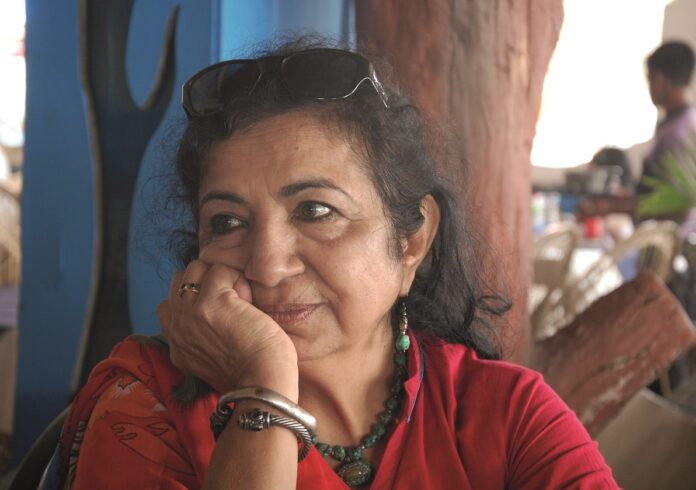IWA Women in Water Award winner Nafisa Barot looks back on the early experiences of setting up an NGO in India and at how its approach and the need for community empowerment remains valid today. By Keith Hayward.
When Nafisa Barot was announced in May as the latest winner of the IWA Women in Water Award, the list of recipients for that award was joined by an influential water and sanitation advocate. As a founder, former Executive Director, and current Board member of Indian NGO Utthan, Barot has worked for many years to influence people and policies around water, gender justice and sustainable development.
Barot explains that Utthan was started at a time when the government allowed NGOs to take on the task of developing block-level plans.
“In 1979/1980, some of us who were part of starting this organisation called Utthan had done a block-level plan of one of the very, very resource-poor blocks of Gujarat,” she says.
“The plan was for Dhandhuka block, in the state of Gujarat. The interventions started in Bhal, which is one of the regions of Dhandhuka and is approximately 100km south-west of Ahmedabad, the largest city in the state. Barot describes the area as being extremely saline, flat and apparently with a lot of mirages but not a drop of fresh water to drink!”. “The land, which was once upon a time lush green with several salt tolerant species, was now completely barren,” she says, adding that outsiders, such as researchers of the government, would therefore ask why people would live in such an area.
“When we started talking to the communities, asking what can be done, there was a difference between what women said and what men said,” says Barot. “Men were saying there was a need to create opportunities for employment to counter migration, she says, explaining that almost 80% of people used to migrate from the area.”
Women offered a different view. “Women were saying that, unless or until we address drinking water issues, we cannot make any kind of change, any kind of development, in that area,” says Barot.
The views of women therefore greatly influenced the direction of the support given by Utthan. “Utthan had not gone with a preconceived programme or a project on water or sanitation in mind,” says Barot. In 1981, Utthan helped set up a local organisation called ‘Mahiti’ for initiating sustainable processes of empowerment and change based on the community’s issues and responding to the strong needs articulated by the most vulnerable, especially by the women, explains Barot. “Water, very clearly, came as a priority issue from women,” she adds.
Water concerns and solutions
Barot saw that villages were at the time being supplied by a long distance pipeline feeding underground tanks. Problems with that supply were contributing to conflicts in the community.
“We saw fights over water and what it did to the community, especially the impact it had on women, the anxiety, the injuries they had,” says Barot, highlighting other problems too, such as girls not being able to go to school and conflicts between families. “It was a very dire situation,” she adds. “We tried to understand the overall picture of why there was this problem in this area of Gujarat, which even then was supposed to be a very developed state,” says Barot.
A number of issues were identified that related to the centralised system supplying the area with water.
Barot explains that the supply was by a pipeline almost 100km in length, requiring pumping of the water. Electricity supply interruptions, pipeline breakages and theft of water combined to mean that those at the end of the pipeline “rarely got water one way or another”. “There were social issues because, when you have a system like this, people who are at the tail end have no control,” she says.
There were also water quality issues. “The source of that water was groundwater. We saw that all the farmers around that source also started extracting water, and the water table started depleting and going down and down,” says Barot. “As it went down, more salinity started coming, so both the quantity and the quality were problems.”
Barot adds an important further issue connected with the centralised supply. “We found that this whole centralised system had completely displaced people’s own knowledge and their own systems of rainwater harvesting and managing that water,” she says. “Those sources, over a period of time, got depleted, because the sole engineering input was given to bringing water from outside, totally discarding the traditional systems. That was a tragedy.”
This displaced knowledge would however prove to be the opportunity for a new community-driven approach.
“We used to always sit and try to listen to what women and men were saying about their previous systems,” says Barot.
One traditional approach had been to collect rainwater in ponds. Use of these was discouraged with the arrival of the pipeline, as a result of which the ponds started silting up. Barot explains that migrating people had also seen how liners were being used in irrigation canals, to prevent seepage. So the local people came up with the idea of desilting and deepening these ponds and lining them so they would not be affected by salinity. “That was a very innovative combination of a traditional system and modern technology,” says Barot. Other alternatives included collecting roof rainwater for use as drinking water at the household level.
“Women, once they found these alternatives, were very charged,” says Barot, adding that they were encouraged by the Utthan team to approach government to get support for digging and lining the ponds.
“That’s how the journey began,” says Barot.
Foundations and principles
This early approach has remained as the foundation of how Utthan operates.
“Utthan had this concept that we would build the values of gender justice, equality, humanity and peaceful coexistence in local communities who will then define their change rather than, as outsiders, us coming in and saying what we should and should not do. They should define their change,” says Barot. “For 40 years, Utthan has not gone on its own with a project – it has always consulted the communities.”
In the case of the Bhal area, Utthan worked there for 14 years. At this point, the local organisation, Mahiti, became independent.
“Our concept is that there should be a local organisation who should really be taking these processes ahead,” says Barot. With the name Mahiti, she says there is a connotation of the exchange of information. “We saw that this exchange of information, or dialogue, is a very powerful instrument to bring about change at any level,” she adds.
Barot explains that, from 1994, Utthan began to look to other parts of Gujarat. For example, in the coastal areas there were issues around industries moving in and wanting land. Water was also an issue in tribal areas.
In 2002, Gujarat experienced what is generally referred to as a communal conflict, but which Barot describes as “a massacre of one particular community”. “We felt that we had to work very closely with the communities in conflict,” she says.
When Utthan begins to work in an area, Barot says the first step is to carry out a situational analysis. That includes looking at who the most vulnerable people are and what the different vulnerabilities are. “We have learned over a period of time that there are different vulnerabilities and how to deal with them,” she says.
“When we started, we realised that water was not just a technical issue and a commodity. Challenges of unequal power relations played a major role, through caste, class, gender, and a hostile environment – both ecological and social, with severe gender, class and caste-based violence. Over time, many other vulnerabilities really got added, depending on where Utthan is working,” says Barot.
While the scope of Utthan’s work in terms of vulnerabilities has broadened, Barot sees that the core approach of Utthan has remained constant. “The principles that we are talking about are the same,” she says.
Decentralisation and empowerment
The work provided the foundation for Utthan to share its experiences, including at the World Water Forum in The Hague in 2000.
“We shared these lessons with so many organisations. We said that, if we really want to address drinking water or sanitation, the answer is in empowering communities,” says Barot. “The answer is in gender-sensitive approaches, in creating those structures where women and the concerns of the vulnerable are centrally placed in the decision-making, their capacity-building, and the space they are given for decision-making. We learnt in different geographies and ecologies, decentralised solutions differ but the core issue of devolution of power remains the same.”
Such thinking, promoting diversity and decentralisation, does appear to have taken stronger hold today. “Ours is just one small example. There are so many thousands of examples of such decentralised, gender-sensitive, alternatives which one is asking the government and others to really implement,” she says.
However, she questions the extent to which a real transfer of power is taking place. “People have started picking up words saying that there has to be participation, there has to be women’s participation. You know, we are not talking about just participation of women and people, we are talking about empowerment, and empowerment is about creating an enabling environment for bringing change in the power relations between vulnerable and powerful at all levels, from family to community to government, where women and others are not just passive recipients but have a stake and space in decision-making and are contributors in knowledge building,” she says.
Solution selection
This call for empowerment extends to the way that water and sanitation projects are implemented. Barot can see this might present a challenge for engineers, who, she says, are taught that they really have the solution for people. “We are talking about including processes that will facilitate a devolution of power,” she adds.
With this in mind, Barot offers some suggestions on how the sector might approach delivering technical solutions.
“My message to those with this technical background would be to just go and listen to people, especially to listen to the women and most vulnerable – sit down with them, and try to understand from them what the issues are and what their technical, ecological and sociological alternatives are,” she says.
Barot, of course, sees that new technologies can offer benefits. She also sees that, brought together, the two sets of knowledge can result in better end results. “They could bring in so much of knowledge from outside, but it cannot completely displace the local knowledge and alternatives. Rather, it has to enhance the local knowledge,” she says, adding: “The objective of using the knowledge or technology has to be to address the issues of people, meaning the most vulnerable communities, women.”
Water work to do
Barot continues to mentor the Utthan team, which currently operates in six districts.
She explains that efforts to spread knowledge underpin Utthan’s approach, with a strategy to form knowledge-learning teams within Utthan that reach out to others. “We call it the People’s Learning Centre,” she says. “It’s not a physical centre but it is more a concept of people coming together to influence others to do capacity-building in other states.” This aims to exert influence by creating more layers at the community level, she explains.
Despite putting her energies into Utthan for 40 years, leading the teams, she is drawn to give more, including to a number of other organisations, because of the momentum around its work. “It’s growing, growing, growing. There are more people with you, there are more women’s voices with you, who are very passionate and who want to really fight for their rights and justice. That sensitive, aware, collective energy to bring about change will not allow people like us, who have been there for 30 or 40 years, to move anywhere, and I love it,” she says.
Barot also sees that much remains to be done. For example, even now, she says that Utthan and many others are negotiating with government over infrastructure such as water supply pipelines and with contractors building sanitation facilities, to include decentralised rainwater harvesting alternatives and for women’s inclusion in managing water and sanitation. There is still a need to make the case for basic issues, she says. “Let’s come down to clean water security at the community level – that’s what women are saying.” •








